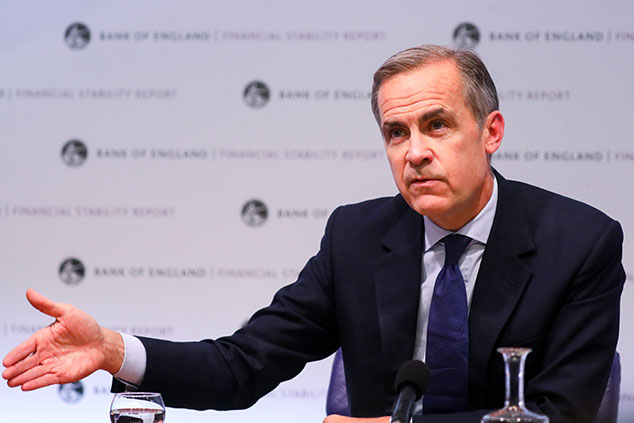
This article is taken from our FREE daily investment email Money Morning.
Every day, MoneyWeek’s executive editor John Stepek and guest contributors explain how current economic and political developments are affecting the markets and your wealth, and give you pointers on how you can profit.
Just before I get started, it’s just over a week until our event in London on 12 February. Not got your ticket yet? Book now!
Last week was pretty exciting for markets – Federal Reserve governor Jerome Powell more than delivered on what they had been hoping for. Not only did he suggest that interest rate rises in the US might be over for the year, he also acknowledged that the apparent panic in markets had some bearing on his decision.
In other words, the “Powell put” has arrived, regardless of how much he tries to deny it.
This week it’s the turn of the Bank of England. Whatever Mark Carney says, it won’t be anywhere near as significant for markets as Powell’s move.
But for UK investors, we might get a hint as to whether interest rates will ever get back above 1% again.
The big event for UK investors: the Bank of England meets
The Bank of England (BoE) delivers its latest decision on interest rates on Thursday. The chances of rates moving are practically non-existent. While Brexit remains a live issue, BoE governor Mark Carney has all the excuse he needs to keep rates low, even although wage growth is now above 3% and unemployment is near record lows.
However, what might be more significant is the Bank’s quarterly inflation forecast. That’s where we’ll get an indication of how the Bank thinks things will pan out this year. (The forecasts themselves are worth little, but it’s useful to have an idea of what those who run the Bank are currently thinking.)
Samuel Tombs of Pantheon Economics reckons that markets have grown too comfortable with the idea that the BoE won’t raise rates, and thus may receive a hawkish warning shot across the bows. Similarly Capital Economics reckons that unless there’s a no-deal Brexit, then the BoE will “raise rates sooner and further than widely expected.”
Also on Thursday, the latest Halifax house price index is out. This is unlikely to tell us anything new – the Nationwide index at the tail-end of last week showed that house prices grew by just 0.5% in 2018, and the Halifax figures will probably be similar. I’m really just highlighting it because I know you can’t get enough stories about house prices.
On that note, if you’re in the market for a multi-million pound super prime property, now may be the time to buy. The FT reports that prices for homes valued at above £10m are being “slashed”, with mortgaged buyers facing “margin calls”, and in some cases, repossession and forced sale.
So if you’re after a pied-a-terre in a fashionable nook of London and you have a spare £10m burning a hole in your pocket, what are you waiting for?
What else is happening?
In the US, Donald Trump gives his delayed “state of the nation” address. It’s unlikely to contain anything new, but you never know with Trump. Negotiations with China appear to be going relatively smoothly for now but expect that one to rumble on for a long time.
And as Chinese New Year kicks off, China’s economic slowdown also promises to be an ongoing problem for the global economy to contend with. As Diana Choyleva of Enodo Economics points out, China’s turn away from the idea that “to get rich is glorious”, is hardly good news for consumer demand.
Meanwhile, the burgeoning “tech war” (which is what the trade war really is) between the US and China will also hit trade and manufacturing hard. As a result, we’re likely to see more “stimulus” in the form of state-backed spending on infrastructure. However, given simultaneous efforts to make the banking sector less fragile, this is unlikely to have the same effect as in the past. Something to keep an eye on.
Meanwhile, it’s a busy week for company news. On the house-prices front, it’s housebuilder week in the UK: we get first-half results from Barratt and Redrow, and an update from Bellway on Thursday. The stocks have been rebounding strongly this year, so all eyes will be on the outlook, not least in respect of sustainability of dividends.
On Tuesday, we get full-year results from online grocer Ocado. Investors will be particularly interested to learn more about a rumoured partnership with Marks & Spencer. And oil giant BP reports too – it is expected to report pre-tax profits of nearly $15bn, almost double last year’s.
On Wednesday, we get full-year figures from pharma giant GlaxoSmithKline, where the main item of interest could be any further news on the company’s planned split into two (it is spinning off its consumer division into a joint venture with Pfizer).
Later today in the US, we get full-year results from Google’s parent company, Alphabet. It’s the last of the FAANG tech stocks to report. They’ve all rallied well so far this year, although Alphabet is the one which has shed the least ground from its 2018 high, so there may be less scope for a big rebound. The outlook for advertising revenues should also give us a clue as to just how much of a slowdown we’re really seeing in the global economy.
Other companies reporting in the UK this week, include medical group Smith & Nephew, which reports full-year figures on Thursday; a trading update from utility group SSE on Friday; and full-year results from property developer St Modwen on Tuesday.
PS Be sure to get your tickets for our event on 12 February, when I’ll be talking to Tim Price and Netwealth’s Iain Barnes about how trade wars, Brexit and central bankers are affecting markets – and Book now!